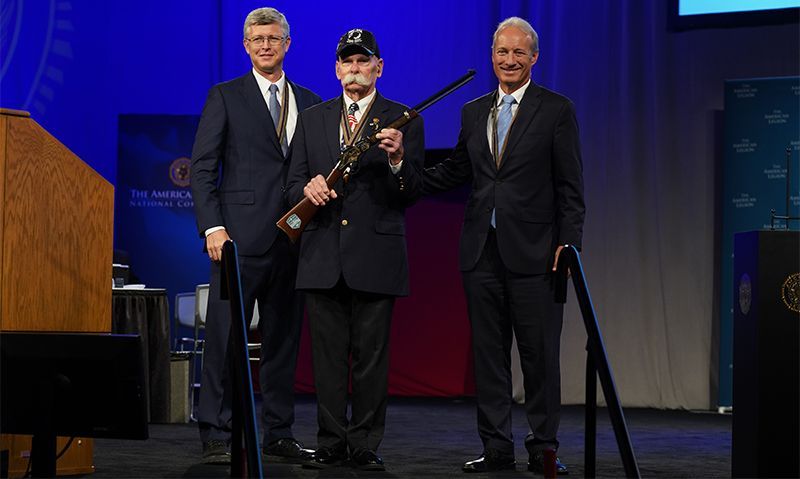
The award, honoring religious freedom, pays tribute to the network’s ongoing fight for a POW-MIA table at a VA facility in New Hampshire.
First Liberty Institute President and CEO Kelly Shackleford reflected back two decades ago during his presentation at The American Legion’s national convention in Phoenix on Sept. 1.
“It was almost 20 years ago when we realized that something was happening in the country,” Shackleford said. “There were attacks on some of our monuments. First, it was the Ten Commandments. We realized that there would be attacks on our veterans memorials. This was just a sign of what’s coming.”
First Liberty reached out to Past National Judge Advocate Philip B. Onderdonk, who agreed and the two organizations have worked together to protect several high-profile veterans memorials from being torn down. Among them:
• Mount Soledad: The Mt. Soledad National Veterans Memorial was conceived in 1952 by American Legion Post 275 of La Jolla, Calif., to honor war veterans of the Korean War. A 27-foot cross at the apex of Soledad Natural Park in La Jolla was built in honor of U.S. servicemen who had died during the two world wars and the Korean conflict. The case went through various lower court rulings but the memorial has ultimately prevailed. “That memorial is still standing,” Shackleford said. “And you can still see that memorial today.”
• Mojave Desert: The memorial was erected in 1934 by World War I veterans “who just wanted to put up something to remember those who were lost in that war.” First Liberty and The American Legion won a Supreme Court case, which allowed the memorial to continue to stand, though the ruling was on technical issues.
• Bladensburg Peace Cross: Two years ago, The American Legion and First Liberty returned to the nation’s highest court in a case involving the 40-foot Bladensburg Veterans Memorial Peace Cross. The memorial was erected in 1925 by Gold Star mothers and The American Legion to honor 49 sons who made the ultimate sacrifice during the first world war. Justices ruled for The American Legion, 7-2. “That was not only a win for the Bladensburg cross,” Shackleford said. “It set a precedent. It was really a landmark victory that all memorials and monuments across our land are presumptively constitutional and these attacks are over. That’s a huge change.”
However, there are other cases pending, Shackleford pointed out.
One of those relates to a POW-MIA missing man table that was set up at a VA hospital by the Northeast POW-MIA Network. Included on the table is a Bible. The lawsuit calls for the removal of the Bible from the display.
“The man who donated the Bible was in a German prisoner of war camp for almost a year,” Shackleford said. “He said the Bible is what got him through that experience. He wanted to donate this Bible for this display.”
To honor the POW-MIA Network’s fight, Shackleford presented David Haskell, the organization’s president, with the Philip B. Onderdonk Jr. Religious Liberty Award on the national convention stage. The award is a gold-plated Henry Repeating rifle engraved with images of a bald eagle, the Statue of Liberty and the Liberty Bell.
The award is presented annually to someone who has done the most for religious freedom in the United States.
Haskell thanked North Conway Post 95 in New Hampshire for its help in setting up the table at the VA in Manchester, N.H. He credited Bob Jones with starting the network from American Legion Post 49 in Vermont 34 years ago.
“The table at the Manchester VA is a symbol of what we will stand for forever, until all our POWs and MIAs are returned home safely,” Haskell said.
Shackleford reminded attendees that the legal battle will continue.
“We are so proud to be with The American Legion,” he said. “We’re going to keep fighting until we win. These are the battles coming.”
- Honor & Remembrance

